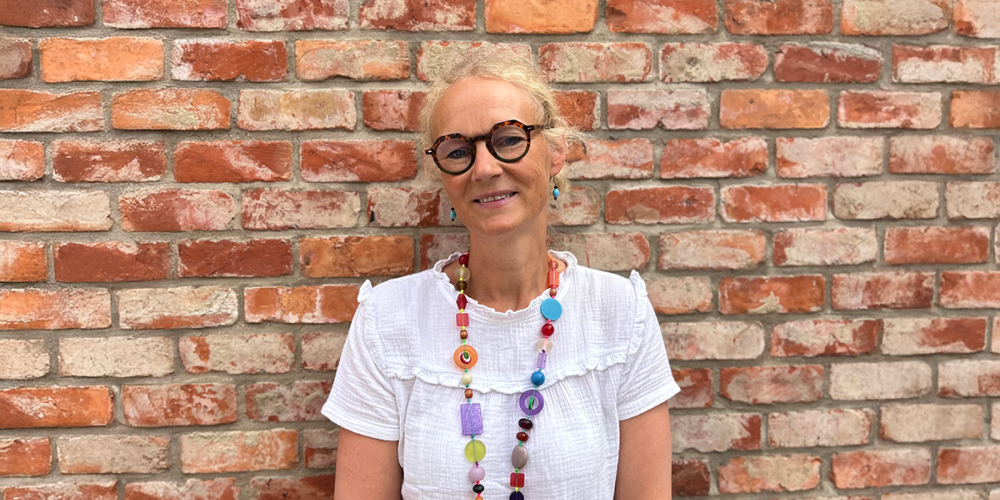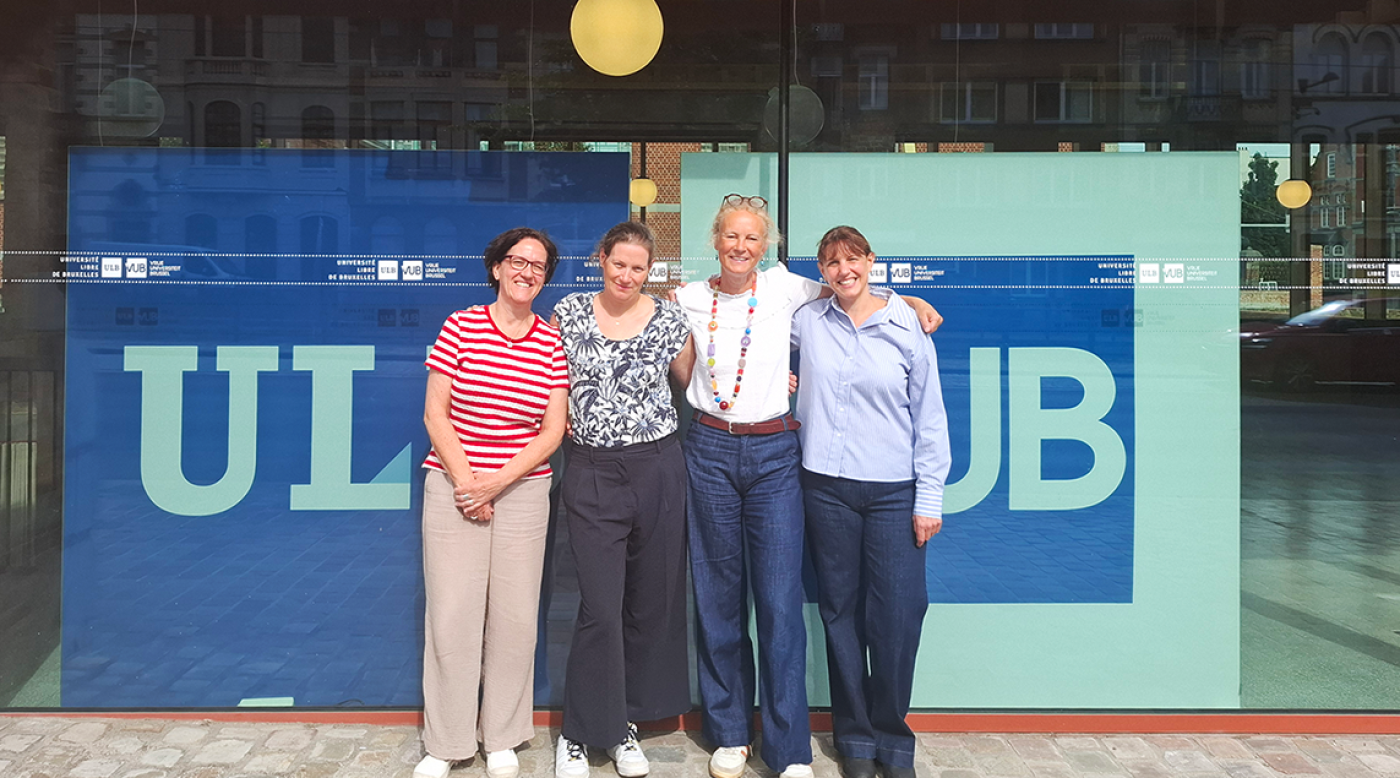
With the newly founded Andrée Geulen Non-Profit, VUB and ULB aim to deepen their collaboration, looking ahead to their shared 200th anniversary in 2034. Newly appointed director Gaëlle Raskin is making communication her top priority. “We need to get to know each other better. That’s how prejudices fade and how both universities can grow stronger.”
You worked for 25 years in petrochemicals and later as an entrepreneur and consultant. What drew you to this new role as director of the Andrée Geulen Association?
“To answer that, I need to go back to my student days. Thirty-five years ago, as a Ghent native, I did my undergraduate degree in Business Engineering at VUB, through a programme of the then Solvay Business School, and my postgraduate studies at ULB. That was quite progressive, since back then most students stayed at one university throughout their academic career. For me it was a brilliant opportunity. I received a perfectly bilingual education, which has been a career booster and a daily enrichment ever since. Today, similar programmes exist, but far too few students take advantage of them. That’s a missed opportunity for society. With the Andrée Geulen Non-Profit I want to help strengthen such collaborations and show the value of being multilingual and multicultural.”
Which lessons from the business world are you bringing with you?
“One important insight is that change never happens overnight. Especially today, in a climate where the two communities are drifting apart, you can’t expect things to just fall into place. It requires structure and lots of communication. As long as people don’t know each other, they can only guess what’s going on in someone else’s head. Communication is crucial before jumping to conclusions. And once you’ve made clear agreements, sticking to them is essential if you want to move forward together. Another lesson is that you create more value by consolidating and strengthening existing projects than by constantly launching new ones. Building on what’s already there delivers more – and certainly faster – results than starting from scratch.”
“Change takes time, but always starts with communication”

Earlier collaborations were supported by the Brussels University Alliance (BUA). Why has this now become the Andrée Geulen Non-Profit?
“The BUA played an important role at the time, but the real driving force behind the structural collaboration with the ULB was Rector Paul De Knop. Together with his ULB counterpart Didier Viviers, he laid the foundations for projects such as the LIC and Usquare. His successors, Caroline Pauwels and Yvon Englert, went on to deepen the partnership, notably through joint academic opening ceremonies attended by the King and collaborative initiatives such as WeKonekt.
.These projects prove that together you can achieve more than alone. Neither VUB nor ULB could have realised them in the same way on their own."
The BUA brought together people from both universities to support joint activities. But the alliance had no legal authority. To organise and strengthen cooperation in the long term, we needed an independent structure that could keep the partnership high on the agenda of rectors Annemie Schaus and Jan Danckaert and their teams, and also represent both universities externally. Neutrality was key here. The non-profit serves the interests of both universities equally, even though they’re not the same size. Operational tasks remain divided between ULB and VUB, but the non-profit will act as a neutral third party to keep things running smoothly, add structure, and take decisions where needed.”
Andrée Geulen was a teacher who saved many Jewish children during the Holocaust. Why was the non-profit named after her?
“Andrée Geulen lived in Ixelles. We wanted a local heroine first of all. She wasn’t Jewish herself, but she saved hundreds of children in the Second World War. In other words, she did what was right, without judging, without borders. That aligns perfectly with the philosophy of ULB and VUB. Andrée succeeded because she managed to mobilise different resistance groups across divides. There’s a strong parallel here: when we accept differences and work together, our impact grows. Between the Flemish and French-speaking sides of Belgium, there are also many barriers – in language, culture, and even legislation. VUB is bound by the Flemish decree, ULB by the Walloon one. There’s a lot to bridge. And that’s exactly what we’ll do: build bridges between the two universities.”
“Andrée Geulen did what was right, without borders. That is also our philosophy”
Which upcoming projects excite you most?
“There are already many strong joint projects that we support and that both universities should be proud of. The Usquare and LIC buildings, the joint master’s programmes like Bruface and MUS, exemptions on property tax for student housing, Brussels Pride and St V, or research projects like FARI and BrIAS… I could go on. We’re now building a governance structure that maps these projects and ensures they get the right attention in both universities’ systems. We’re also exploring areas where further collaboration would be beneficial.
Another issue is visibility. Many of these collaborations remain under the radar. We want to communicate more internally so students, academics, researchers, and support staff can get inspired. A great example comes from the IT departments of VUB and ULB. Their directors regularly meet and, for instance, purchase computers and software together to secure better deals. More people should know this. By getting to know each other and recognising the added value, appreciation for the ‘other’ university will grow – and so will mutual understanding.
Externally, we could also join forces more often. Both universities face the same challenges: mobility in the university district, shortage of student housing, changes in funding, uncertainty around the Brussels government. Addressing these together with the relevant authorities is far more effective.”
To make this collaboration happen, you encourage people to find their alter ego at the other university. Any ideas on how they might do that?
“We want to encourage everyone to contact their alter ego. Most people know where to look; it’s often just a matter of making the time – or getting the time from their counterpart. If not, they can always reach out to us. The Andrée Geulen team will be happy to make the connection.”
“Language? With some courage and goodwill, it can definitely be bridged”
Does this also require more focus on language skills?
“You don’t learn to communicate with others only through language classes. We need more confidence in using the other language, more courage. And you only build that by being in contact, and by being patient with yourself and with others. We already have a good modus operandi: everyone speaks their own language, but brings enough passive knowledge to understand the other. I won’t pretend language isn’t a barrier, but with goodwill it can definitely be overcome.”
In 2034 both universities turn 200. How close do you hope they will be by then?
“I hope that by 2034 we can celebrate this anniversary with real enthusiasm, and that collaboration is firmly seen as an indispensable added value for both universities.”
Andrée Geulen Vision 2034
The Andrée Geulen Non-Profit wants to grow VUB–ULB collaboration into a vibrant university hub. A place where both universities strengthen each other, where sustainability and diversity are at the core, and where their joint role as pillars of the Brussels ecosystem becomes even more visible.